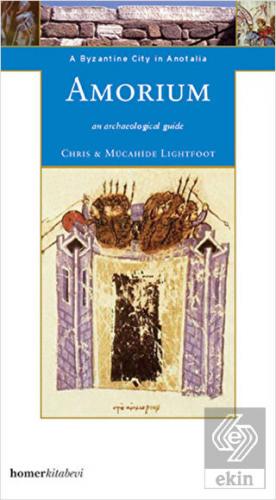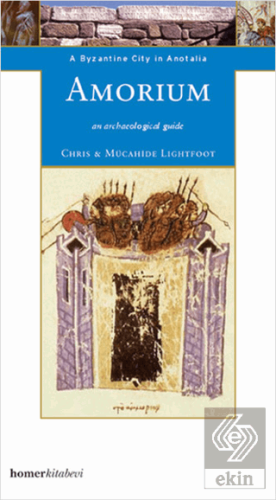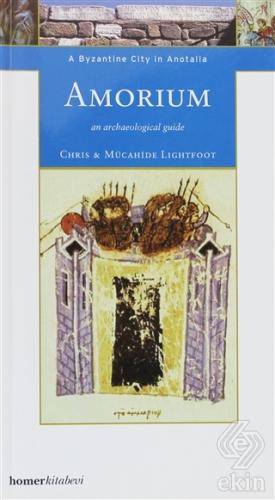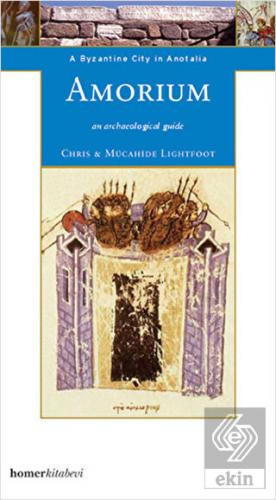9789758293803
487322

https://www.ekinkitap.com/amorium-a-byzantine-city-in-anatolia
Amorium, a Byzantine City in Anatolia
319.80
These archaeological guides are written by well known archaeologists with the thought that they might evoke the spirit of these places for those who are interested in remains of Anatolian civilizations. Illustrated with beautiful photographs, equipped with helpful plans and drawings, they are essential to travellers to Turkey.
In 1836, William Hamilton identified the site of Amorium and provided the first description of the ancient ruins.
"We reached the deserted and dreary site of what was once a populous city... Near the centre of the valley in which the ruins are situated... is an insulated hill about half a mile in circumference, on which may still be traced a portion of the walls of an Acropolis...
The principal part of the town is to the S. and S. W. of the Acropolis... These ruins... appear cheefly to date from the early Byzantine or Christian period..., marking the existence of one of those large and important towns which were destroyed in this part of Asia Minor by the irruptions of the Saracens and the Seljukian monarcahs of lconium."
Much of what Hamilton described has now disappeared, but since 1988 the Amorium Excavations Project has been able to reveal other ruins that testify to the accuracy of his assessment of Amorium as an important Roman and Byzantine city. This guidebook aims to give an interim account of the on-going excavations and set the site in its proper historical context.
In 1836, William Hamilton identified the site of Amorium and provided the first description of the ancient ruins.
"We reached the deserted and dreary site of what was once a populous city... Near the centre of the valley in which the ruins are situated... is an insulated hill about half a mile in circumference, on which may still be traced a portion of the walls of an Acropolis...
The principal part of the town is to the S. and S. W. of the Acropolis... These ruins... appear cheefly to date from the early Byzantine or Christian period..., marking the existence of one of those large and important towns which were destroyed in this part of Asia Minor by the irruptions of the Saracens and the Seljukian monarcahs of lconium."
Much of what Hamilton described has now disappeared, but since 1988 the Amorium Excavations Project has been able to reveal other ruins that testify to the accuracy of his assessment of Amorium as an important Roman and Byzantine city. This guidebook aims to give an interim account of the on-going excavations and set the site in its proper historical context.
These archaeological guides are written by well known archaeologists with the thought that they might evoke the spirit of these places for those who are interested in remains of Anatolian civilizations. Illustrated with beautiful photographs, equipped with helpful plans and drawings, they are essential to travellers to Turkey.
In 1836, William Hamilton identified the site of Amorium and provided the first description of the ancient ruins.
"We reached the deserted and dreary site of what was once a populous city... Near the centre of the valley in which the ruins are situated... is an insulated hill about half a mile in circumference, on which may still be traced a portion of the walls of an Acropolis...
The principal part of the town is to the S. and S. W. of the Acropolis... These ruins... appear cheefly to date from the early Byzantine or Christian period..., marking the existence of one of those large and important towns which were destroyed in this part of Asia Minor by the irruptions of the Saracens and the Seljukian monarcahs of lconium."
Much of what Hamilton described has now disappeared, but since 1988 the Amorium Excavations Project has been able to reveal other ruins that testify to the accuracy of his assessment of Amorium as an important Roman and Byzantine city. This guidebook aims to give an interim account of the on-going excavations and set the site in its proper historical context.
In 1836, William Hamilton identified the site of Amorium and provided the first description of the ancient ruins.
"We reached the deserted and dreary site of what was once a populous city... Near the centre of the valley in which the ruins are situated... is an insulated hill about half a mile in circumference, on which may still be traced a portion of the walls of an Acropolis...
The principal part of the town is to the S. and S. W. of the Acropolis... These ruins... appear cheefly to date from the early Byzantine or Christian period..., marking the existence of one of those large and important towns which were destroyed in this part of Asia Minor by the irruptions of the Saracens and the Seljukian monarcahs of lconium."
Much of what Hamilton described has now disappeared, but since 1988 the Amorium Excavations Project has been able to reveal other ruins that testify to the accuracy of his assessment of Amorium as an important Roman and Byzantine city. This guidebook aims to give an interim account of the on-going excavations and set the site in its proper historical context.
ZİRAAT BANKASI
| Taksit Sayısı | Taksit tutarı | Genel Toplam |
|---|---|---|
| Tek Çekim | 319,80 | 319,80 |
| 2 | 166,30 | 332,59 |
| 3 | 115,13 | 345,38 |
İŞ BANKASI
| Taksit Sayısı | Taksit tutarı | Genel Toplam |
|---|---|---|
| Tek Çekim | 319,80 | 319,80 |
| 2 | 166,30 | 332,59 |
| 3 | 115,13 | 345,38 |
Yorum yaz
Bu kitabı henüz kimse eleştirmemiş.













